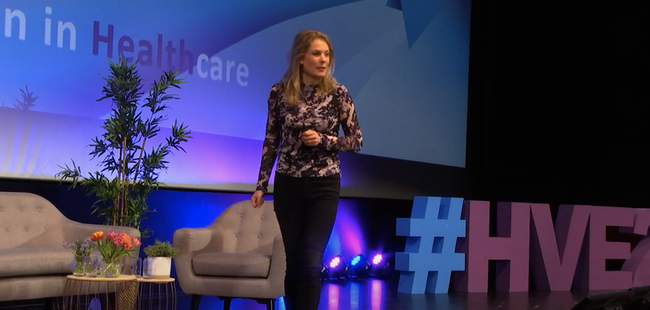Sietske Rozie

Sietske Rozie is an expert in the field of artificial intelligence (AI) in healthcare. She worked as a doctor, including 7 years as a radiologist, from 2004 to 2022. Currently, she is a guest lecturer in AI at Business School TIAS.
AI is increasingly being used in healthcare, especially in radiology where images are analyzed using software containing AI. As these decisions are crucial, it is important to understand what AI can and cannot do and how it should interact with human thought processes.
It is necessary to increase attention and awareness, and to change behavior within healthcare to ensure good implementation of AI without bias. However, Sietske observes an increasing gap between employees who know and work with AI, and those who have a wait-and-see attitude. While the issues and problems that AI can help with should come from the field.
Sietske’s keynotes shed light on the future and possibilities of AI in healthcare. She answers questions such as how to prepare developers and healthcare professionals for this new way of working together and what this means for the role of doctors and the relationship between doctor and patient.
Together with HR expert Roos van Graas, Sietske hosts the podcast “Getting better with Roos&Rozie” for the medical magazine Medisch Contact. They discuss various topics important for sustainable employability in healthcare.
Sietske is still actively involved in the Dutch Society for Radiology, serving as a member of the Quality Committee and as a sparring partner of the Visibility working group. She co-authored a chapter with data scientist Egge van der Poel titled “Kunstmatige intelligentie en data science in de zorg” in the book “Zorg voor transitie” (May 10, 2023). The chapter discusses the roles of various healthcare stakeholders in the vision, strategy, development, and implementation of AI.
“In many cases, the challenges that are more difficult to overcome involve ‘soft’ factors such as decision-making, culture, and trust. These areas of knowledge, which are more subjective, are just as crucial as the validity of the ‘hard’ data and therefore play a significant role in the relatively new research field of data science.”
–Sietske Rozie, Zorg voor transitie (2023)
Some of Sietske’s previous presentations:
Should innovation become maintenance?
ITEA, Eureka, RD&I Cluster Software Innovation Meeting Helsinki 2022
Healthcare is an example of a sector in which employee empowerment and trust are important for the development, implementation, and use of software innovation where AI is used. How do healthcare professionals currently make medical decisions, and why is it important to understand the difference between human and artificial intelligence as a software engineer and as a healthcare professional? How do bias and noise play a role in making medical decisions? What are the needs of healthcare in the field of AI?
Improving with AI
Care&ICT Fair 2022
How does the self-learning machine work in the minds of healthcare professionals, and how do we learn from mistakes? Are we as patients, healthcare professionals, and AI developers aware of our behavior? What can AI improve in this regard, and why is it important to approach the development of AI applications for healthcare in a diverse and inclusive way? How can we ensure that healthcare professionals can investigate whether and how data can optimize their learning capacity?
Sustainable Employability: The Role of Data and AI
Employers’ Organization SIGRA, 2022
Sustainable employability and retention of healthcare personnel; the role of medical leadership and the development of HR in healthcare. How can we help employees stay healthy in a work environment with a lot of attention-grabbing technology? Will the autonomy of the employee change due to the arrival of AI? Who will explain to the patient that the decision is made by artificial intelligence when transparency is gone? How can we learn from other sectors in healthcare?
Transition of Intelligence in Healthcare
Artificial intelligence will not take over your place as a healthcare professional, but rather that of your colleague who does not use artificial intelligence. Is this the end of mediocrity in healthcare and the end of the need for free choice of doctors based on differences in quality? Are we becoming more aware of how we make decisions as doctors, and how does that improve the quality of care? Who will ultimately be responsible for the decisions made by the patient in conjunction with AI? Shared decision-making may take on a different interpretation and meaning.

